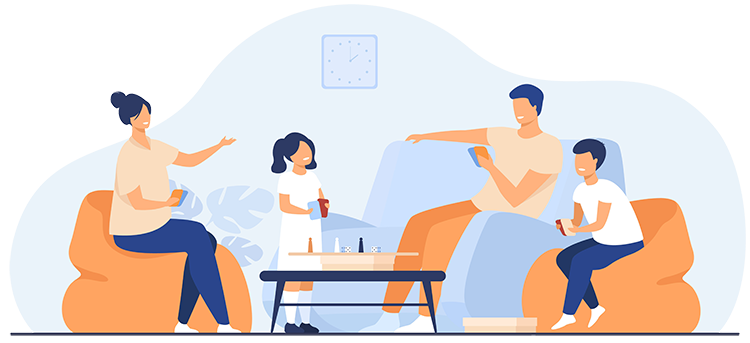
by Beth Ayers, Family Peer Support Lead
March 1, 2023
 Family relationships can be challenging, complicated, wonderful, or any other positive or negative adjective you want to put there! Navigating family relationships becomes even harder when there are health challenges. Raising a child with a behavioral health challenge and/or special healthcare need can put added strain on family relationships.
Family relationships can be challenging, complicated, wonderful, or any other positive or negative adjective you want to put there! Navigating family relationships becomes even harder when there are health challenges. Raising a child with a behavioral health challenge and/or special healthcare need can put added strain on family relationships.
When my child encountered a mental health crisis, it affected the whole family. As a parent, I felt confused, unsure, guilty, and heartbroken. I took up the call to fix things. I like having a plan with foreseeable outcomes and expectations. Mental health challenges defy plans, throw predictability out the window, and rarely have a guaranteed outcome. My relationship with my child had its ups and downs, like all relationships do. But I felt the extreme pressure of every decision, what I said or how I said it, or which specialist I chose being a life-or-death decision. Im sure every decision wasnt, but it sure felt like it. Chronic illness is a marathon, not a sprint. As time went on I got tired- tired of trying to manage an ever changing illness, tired of the stress and worry, tired of the tears, tired of grieving one lost dream after another, tired of fighting with my child as I watched our relationship deteriorate under the weight of it all. More than once I felt like giving up the fight.
There were 3 things that helped me and my relationships:
- Hope. NAMI has a saying in their family support group- We never give up hope. Not only hope of healing from mental health challenges, but also hope that life can be good with mental health challenges. Grieving over the lost hopes and dreams made way for seeing new hopes and dreams and experiencing joy. Hope meant my relationship with my child could be restored and rebuilt. When my child was older and quit speaking to me, I held onto the hope that one day we would connect again. Hope showed me all the things I was grateful for. Hope helped me not give up.
- Love. A parents love for their child is powerful. I learned how to separate my feelings for my child from my feelings of the illness. I could love my child and hate the effects of the illness. And, yes, at times I could be frustrated with both! Love makes me want the best for my child, even when it meant hard choices such as in-patient treatment. Since I would never stop loving my child, I would not give up on our relationship either.
- Support. By support, I mean two things- supporting my child and support for myself. I had to find support from people who were or had experienced what my family was going through. When I talked to people who got it, I felt less alone and less isolated. I could share my feelings without worry of judgement. This is one of the benefits of Family Peer Support. I relied heavily on my support system during times of crisis. Their encouragement and empathy helped me keep going. And the more support I had, the more I could support my child. I couldnt fix it or take away the struggle, but I could be there and support my child. It is important to me to be supportive and do my part to maintain a good relationship with my family, including my child. To me support means not giving up no matter how hard it gets.
Family relationships can be hard. But in my experience, they are the worth fighting for. I cant control mental health challenges and the toll they take, I cant control my child, I cant control the outcomes, but I can resolve to not give up. My relationship with my child is not perfect. But I am so glad for the moments that strengthened us and brought us closer together. I am glad I didnt quit. With support and love, I have hope for the future- whatever it may bring.

